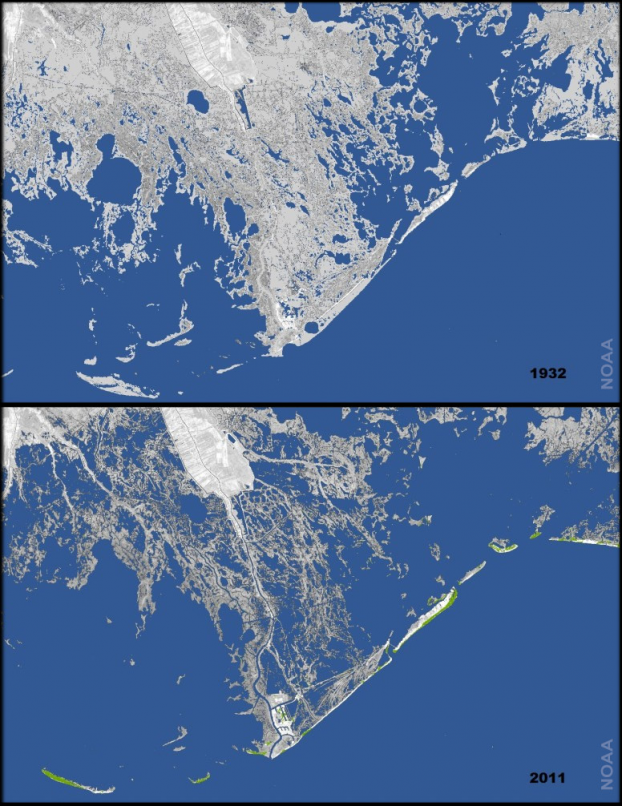
Big Oil drills. Big Oil digs canals. Big Oil does not clean up the mess they make. The state is complicit as they do not hold Big Oil accountable. Now the courts might.
A federal appeals court in New Orleans on Monday ordered a nine-year-old lawsuit filed against oil and gas companies over damage to Louisiana’s wetlands to be returned to state court for trial, potentially clearing the way for at least 41 similar suits — alleging billions of dollars in damages — to also move forward. A three-judge panel of the U.S. 5th Circuit Court of Appeals upheld a January decision by the late U.S. District Judge Martin L.C.. Feldman of New Orleans. It returns the suit filed by Plaquemines Parish against Chevron USA, Exxon Mobil Corp., ConocoPhillips Co., BP America, and Shell to the 25th Judicial District Court in Plaquemines Parish. The panel ruled that Feldman correctly found that just because oil and gas exploration and production operations occurring during World War II were conducted on behalf of the war effort, the companies were not acting under the orders of federal agents in a way that would require the suit to be heard in federal court. “Today’s decision will make the history books,” said John Carmouche, an attorney representing the parish and the state. “Finally, Louisiana can be made whole for everything it has given to our nation in resources.”
nola.com
This open up 42 cases waiting to be tried. 42 of them from one lawyer.
Carmouche said Monday’s decision would apply to all 42 cases in which he is lead attorney, and should result in early trial dates. “All parties agreed that this decision would apply to all cases. We can get to trial in 8 months or less,” he said. However, a spokesman for several of the defendant oil and gas companies on Monday evening could not say if they would appeal the 5th Circuit decision to the U.S. Supreme Court, or that they would agree to apply it to the other cases. “The companies are disappointed by today’s decision of the court of appeals,” said Jason Harbison, on behalf of the legal teams representing BP America, Chevron, ConocoPhillips, Exxon Mobil Corporation and Shell. “The allegations in this case, like the other similar parish lawsuits against oil and gas companies, challenge oil production practices going back for decades, including World War II, a unique period in the relationship between the federal government and the oil and gas industry,” Harbison said. “The companies continue to believe that these lawsuits implicate distinctive federal interests and deserve to be heard in a federal forum and are considering their options for further review.” This is the fourth time that this first wetlands damage suit has been ordered returned to the Plaquemines court by federal judges. A 43rd suit, filed on behalf of Orleans Parish, also was removed to federal court and could eventually be returned to state court.
The initial suits were filed in many courts around the area.
The lawsuits were originally filed in state courts in Plaquemines, Jefferson, St. Bernard, St. John the Baptist, Vermilion and Cameron parishes between 2012 and 2017. The suits were all filed by the Talbot, Carmouche and Marcello law firm of Baton Rouge on behalf of parish governments. The state and Attorney General Jeff Landry intervened in all the suits to protect the state’s rights. Monday’s ruling again means the suits might serve as a stick to force oil and gas companies to pay for damage they caused to Louisiana’s rapidly eroding coast. The suits were narrowly written to avoid having them heard in federal court by only challenging the failure of the oil companies to comply with the State and Local Coastal Resources Management Act, a 1980 state law. Each suit contained language specifying that it was not challenging the companies with violation of any federal laws. The damages cited in the suits stem from actions the companies and their predecessors took to build service canals, improperly dispose of hazardous waste and saltwater, and by conducting other operations that caused damage to wetlands. Each asked that the companies either repair the damage or pay the parishes and state for the losses.
The judges in the panel were mostly appointed by republicans but none by Trump.
The 5th Circuit panel hearing the case included Judges Carl Stewart, appointed by President Bill Clinton; Jennifer Elrod, appointed by President George W. Bush; and James Graves Jr., appointed by President Barack Obama. Feldman, who died in January 2022, just days after his ruling, was appointed to the bench by President Ronald Reagan. In the ruling, the panel agreed with Feldman that no federal contract or subcontract ordering the oil companies to drill the wells in question had been entered into evidence, and the companies could provide no proof of a supposed “special relationship” between the companies and the federal government’s war effort that made them subject to federal-officer direction. The panel also found that “merely being subject to federal regulations” during the war also was not enough to move the cases into federal court. It disagreed with another argument by the oil companies that, as subcontractors to refineries that held federal contracts, they were obliged to prioritize providing oil, considered a critical raw material, as part of governmental defense orders. The panel pointed out that Feldman had already ruled the companies were unable to provide evidence of any subcontracts or evidence they were subjected to the federal government’s guidance or control as subcontractors.
Some issues will still be waiting to be heard.
Still on hold is a proposed $100 million settlement between Freeport-McMoRan Co., the six parishes represented in the 42 lawsuits, and possibly another six parishes that the company operated in. In 2020, the Legislature shot down a bill that would have set up a method of distributing the money among coastal parishes, and there has been no additional action on the proposal. Carmouche and state officials had hoped the settlement agreement could have been used as a model for similar settlements with other oil companies listed as defendants in the suit.
Virginia, there is a Santa Clause! Thank you Appeals Court.



